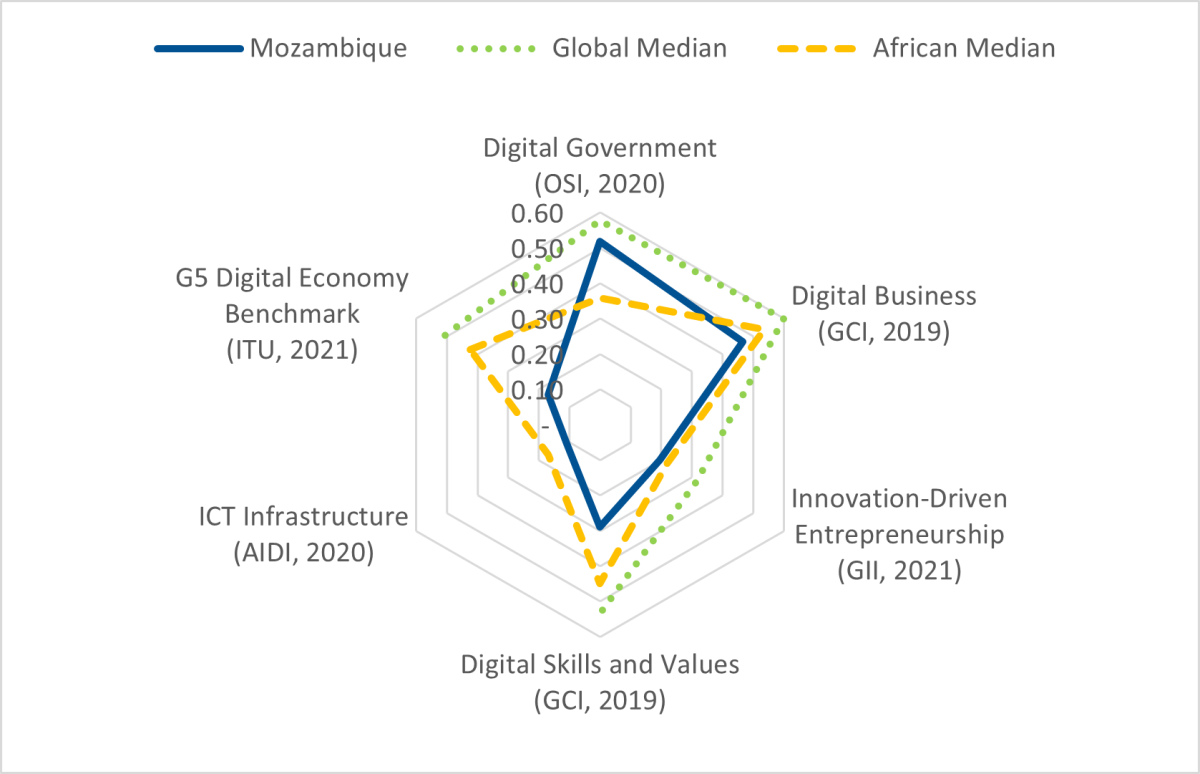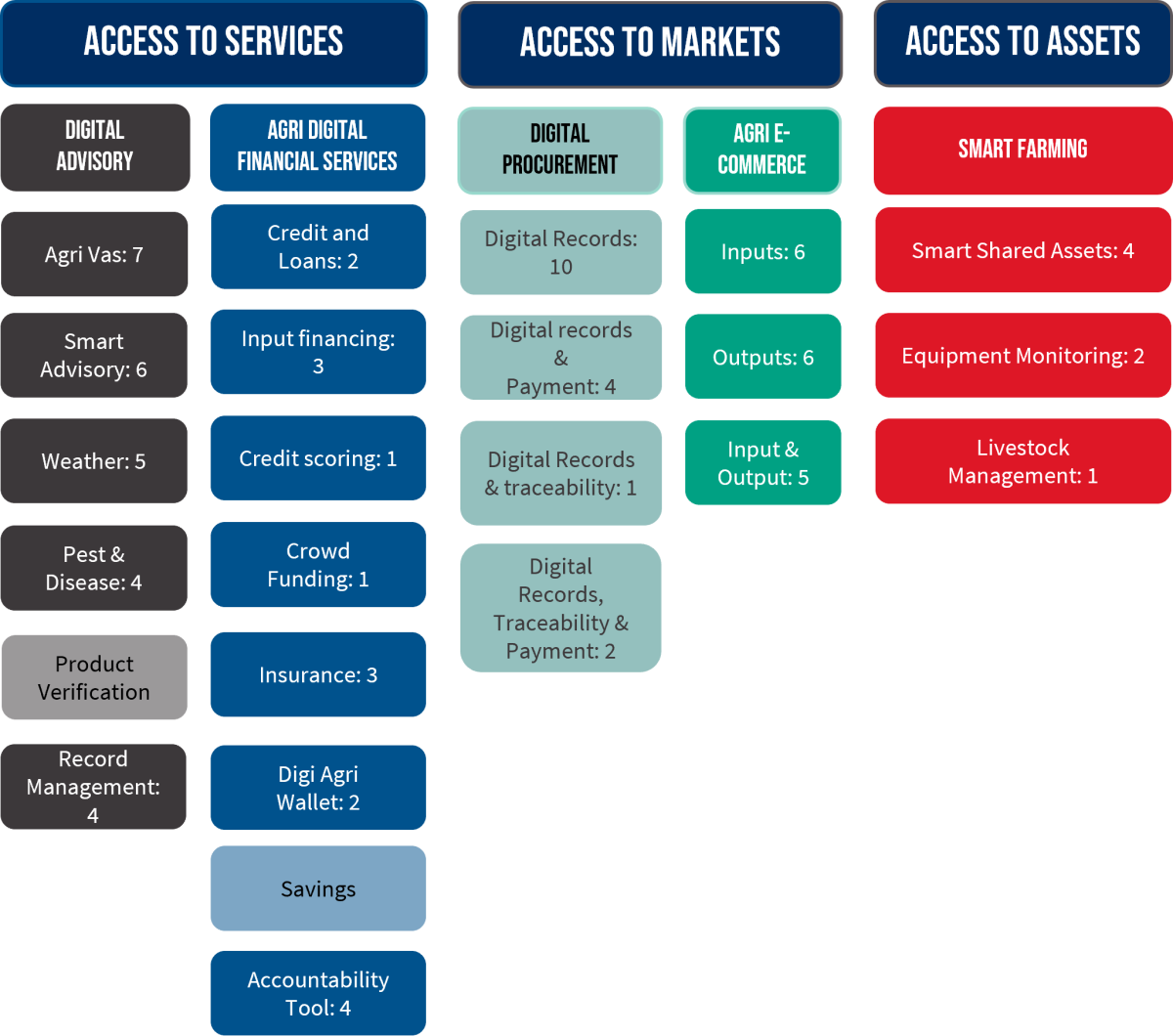Caption: Interactive map presenting country specific data, including universities and incubators contacted for the study and the digital innovations identified at the time of the study
Full Country Report (PDF)
Mozambique Ranked 14 out of 16 Countries in the Benchmark
The benchmark assessment reflects the extent to which Mozambique is unlocking positive pathways towards a digital economy and supporting a vibrant ecosystem of different actors.

Caption: Results from Benchmark Assessment for Mozambique
Mozambique ranked 14 out of 16 in the benchmark assessment which suggests that it is lagging behind the other SADC member states.
Mozambique scored the best in the digital government pillar where it ranked 7 out of 16. This pillar identifies the presence and use of digital services and platforms to enable public service delivery.
| Group | Country | Benchmark Index Score (Adjusted) | Overall Benchmark Ranking |
|---|---|---|---|
| 1 | South Africa | 0.5891 | 1 |
| Mauritius | 0.5839 | 2 | |
| Seychelles | 0.5155 | 3 | |
| Global Median | 0.5064 | ||
| 2 | Eswatini | 0.4222 | 4 |
| Tanzania | 0.4138 | 5 | |
| Botswana | 0.4114 | 6 | |
| 3 | Zimbabwe | 0.3895 | 7 |
| Namibia | 0.3809 | 8 | |
| Lesotho | 0.3802 | 9 | |
| African Median | 0.3595 | ||
| Zambia | 0.3506 | 10 | |
| Malawi | 0.3483 | 11 | |
| Madagascar | 0.3005 | 12 | |
| 4 | Angola | 0.2985 | 13 |
| Mozambique | 0.2919 | 14 | |
| DR Congo | 0.2782 | 15 | |
| Comoros | 0.2497 | 16 |
Caption: Overall Benchmark Assessment Results and Rank for all SADC member states
For further information on the benchmark results and regional trends please read the Situational Analysis Report.
Digitalization in Agricultural Policies and Strategies Must be Prioritized
ICT has consistently been integrated into national development plans, and was reinforced by the National Strategy for Broadband in 2018 and Information Society Policy of Mozambique.
No specific sectoral strategy or policy on digitalization within agriculture was identified.
Agriculture was identified as a priority within national plans but the integration of digitalization has been less apparent in agriculture sector strategies and plans. Currently, policies are more directed towards guiding and encouraging innovation and entrepreneurship.
Strategies and policies need to support a conducive environment for innovations aimed directly at agriculture stakeholders, including farmers.
Many of the challenges faced in the rural agriculture sector cannot be addressed only by policies and strategies led by the Ministry of Agriculture, a whole-of-government approach is required.
Twenty-three Innovations Identified in Mozambique that Predominantly Provide Digital Advisory Solutions
All use cases were present in Mozambique, with digital advisory and procurement the most common.

Caption: Diagram illustrating number of identified innovations and their sub use case solutions.
The surveyed innovations addressed all stages of the value chain. Innovations targeted a wide range of outcomes predominantly addressing knowledge gaps related to low productivity, and poor access to markets.

Caption: Diagram illustrating number of innovations identified in each phase of the value chain.
The major challenges innovators experienced was the lack of digital literacy in their target customers and encouraging farmer uptake and behavior change. There were also factors such as a lack of mobile coverage, low levels of language literacy, electricity, data collection challenges and user affordability.
Most innovations identified in Mozambique are from the private sector and have reached a level of scale. There also seems to be reliance on donor funding in sustaining innovations.
Training in the Digital Agriculture Sector Needs Improvement
There is a wide digital literacy gap that excludes the poorest from the benefits of the digital world. Digital skills across all sectors and at all levels of the skills spectrum must be addressed.
Training institutions and the tertiary education sector need capacity building and better equipment for digital agriculture education. Closer cooperation and exchange of competences between incubators and universities, and between education and the private sector is also suggested to improve the development of digital agriculture curricula and a more entrepreneurship-oriented education for the youth.
Mozambique must encourage a larger mass of digital entrepreneurs to build its digital ecosystem and begin transformation of home-grown solutions. Policies and strategies to promote entrepreneurship, access to capital, information and support services will encourage investment in new ventures.
Short-time training for youth in agricultural entrepreneurship should be provided or supported, as well as scholarships for longer term training in this field. Helping Universities and Faculties of Agriculture to see themselves taking a leading role especially in Mozambique where the networks of these institutions appear to be good would be a significant step forward.
Icons - credit to NounProject https://thenounproject.com/






